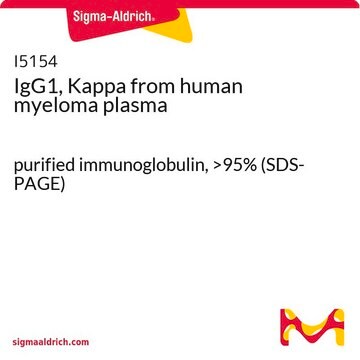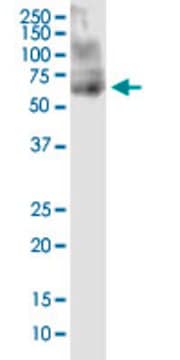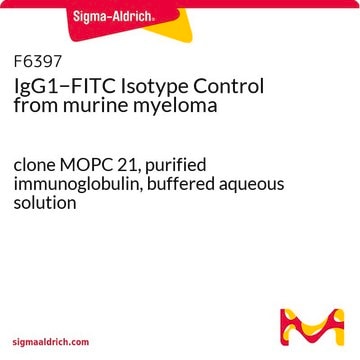M7894
IgG1, Kappa from murine myeloma
clone MOPC 21, ascites fluid, lyophilized powder
Synonym(s):
Mouse IgG1-κ
Sign Into View Organizational & Contract Pricing
All Photos(1)
About This Item
conjugate:
unconjugated
application:
clone:
MOPC 21, monoclonal
citations:
39
Recommended Products
biological source
mouse
Quality Level
conjugate
unconjugated
antibody form
ascites fluid
clone
MOPC 21, monoclonal
form
lyophilized powder
application(s)
research pathology
storage temp.
2-8°C
target post-translational modification
unmodified
Looking for similar products? Visit Product Comparison Guide
General description
The MOPC-21 tumor line that produces mouse IgG1, κ is a mineral oil induced plasmacytoma originated and carried intraperitoneally in BALB/c mice. Immunoglobulins G are made up of two identical light chains and two identical heavy chains, that are covalently connected by interchain disulphide bonds. Mouse IgG is further divided into five classes- IgG1, IgG2a, IgG2b, IgG2c and IgG3.
Application
IgG1, Kappa from murine myeloma has been used:
- in stimulation assay and enzyme-linked immunosorbent assay (ELISA)
- as isotype controls in islet hormone production
- in flow cytometric analysis, in cell migration assay
- as control antibody in evaluation of methylation
Biochem/physiol Actions
IgG antibody subtype is the most abundant of serum immunoglobulins of the immune system. It is secreted by B cells and is found in blood and extracellular fluids. It provides protection from infections caused by bacteria, fungi and viruses. Maternal IgG is transferred to fetus through the placenta that is vital for immune defense of the neonate against infections.
Immunoglobulin G (IgG) participates in hypersensitivity type II and type III reactions. IgG helps in opsonization, complement fixation and antibody dependent cell mediated cytotoxicity.
Reconstitution
Reconstitute with 1 mL deionized water.
Disclaimer
Unless otherwise stated in our catalog or other company documentation accompanying the product(s), our products are intended for research use only and are not to be used for any other purpose, which includes but is not limited to, unauthorized commercial uses, in vitro diagnostic uses, ex vivo or in vivo therapeutic uses or any type of consumption or application to humans or animals.
Storage Class Code
11 - Combustible Solids
WGK
WGK 3
Flash Point(F)
Not applicable
Flash Point(C)
Not applicable
Personal Protective Equipment
dust mask type N95 (US), Eyeshields, Gloves
Choose from one of the most recent versions:
Certificates of Analysis (COA)
Lot/Batch Number
Don't see the Right Version?
If you require a particular version, you can look up a specific certificate by the Lot or Batch number.
Already Own This Product?
Find documentation for the products that you have recently purchased in the Document Library.
The Laboratory Rat (2015)
M A Portelli et al.
Allergy, 72(3), 473-482 (2016-09-15)
Genetic polymorphisms in the asthma susceptibility gene, urokinase plasminogen activator receptor (uPAR/PLAUR) have been associated with lung function decline and uPAR blood levels in asthma subjects. Preliminary studies have identified uPAR elevation in asthma; however, a definitive study regarding which
A Sharland et al.
Transplantation, 65(10), 1370-1377 (1998-06-13)
Liver transplants in the rat strain combination PVG-to-Dark Agouti are spontaneously tolerated, whereas kidney transplants in the same strain combination are rejected in 7-9 days. To identify organ-specific differences that might yield further information about the mechanism of tolerance induction
Differentiation of embryonic stem cells conditionally expressing neurogenin 3
Treff NR, et al.
Stem Cells, 24(11), 2529-2537 (2006)
GM-CSF enhances tumor invasion by elevated MMP-2,-9, and-26 expression
Gutschalk CM, et al.
Cancer Medicine, 2(2), 117-129 (2013)
Our team of scientists has experience in all areas of research including Life Science, Material Science, Chemical Synthesis, Chromatography, Analytical and many others.
Contact Technical Service







